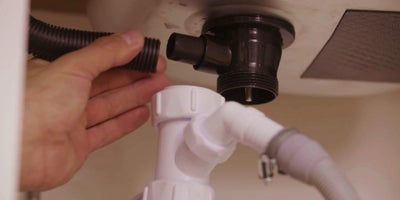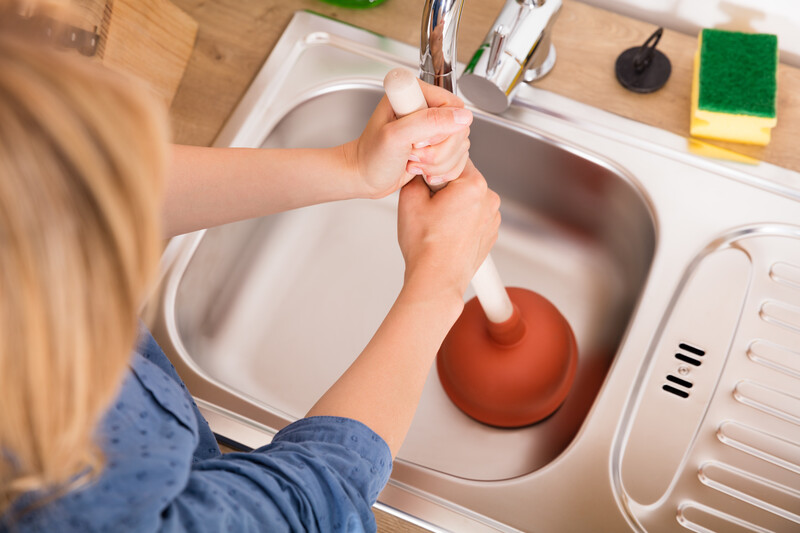Key Advice On How To Correct A Slow-Draining Sink
Key Advice On How To Correct A Slow-Draining Sink
Blog Article
What are your thoughts on 4 Tips to Fix a Slow Draining Sink?

Intro
We have actually all been there: You're brushing your teeth or washing your hands, and you notice the water pooling in the sink. As opposed to promptly swirling down the tubes, it remains, transforming your once-refreshing morning routine into a miniature overload scene. A slow-draining sink isn't just annoying; it's commonly a sign of bigger plumbing issues lurking below the surface. Fortunately is that many slow-draining sinks can be fixed with a little expertise, a couple of fundamental tools, and some patience. All set to tackle this job head-on? Let's roll up our sleeves and dive right in.
Recognizing the Sources Of a Slow-Draining Sink
Prior to you start poking around in your pipelines, it assists to recognize what could be triggering the slowdown. Comprehending the source makes it much easier to select the appropriate solution.
Usual Offenders Behind Slow Drainage
So, what's blocking points up? Commonly, it's a mix of daily particles-- believe hair, soap residue, toothpaste deposit, and leftover food fragments. Gradually, these little bits accumulate and cling to the pipe walls, gradually tightening the passage and making it harder for water to go through. In many cases, natural resource from difficult water can likewise include in the crud, developing the ideal tornado for persistent obstructions.
When is it Time to Take Action?
If you observe the water draining pipes slower than normal, it's a great idea to interfere sooner instead of later on. Waiting too long might lead to finish blockages, unpleasant odors, or even pipe damages. If the water takes greater than a few secs to clear out after switching off the tap, consider it a red flag and get ready to put on your do it yourself hat.
Devices and Products You'll Require
The right tools make all the distinction. Thankfully, you won't require a totally stocked plumber's van to finish the job.
Vital Devices for DIY Services
A bettor is your best beginning factor. A little, sink-sized bettor creates suction that can displace small clogs. For more relentless obstructions, a drain snake (often called a plumber's auger) functions wonders. A pair of gloves, a flashlight, and possibly a pair of safety safety glasses are also handy.
Advised Cleansing Solutions
Moderate meal soap and hot water can help break down greasy accumulation. A mix of baking soda and vinegar is a time-tested natural home remedy, and enzymatic cleansers provide an even more green technique. Maintain chemical drain cleansers as a last resource, as they can be severe on your pipes.
Safety And Security First: Preventative Measures and Preparations
Prior to you launch into unclogging mode, consider security. You're dealing with potentially dirty water and particles, so slip on a pair of handwear covers. If you're making use of chemical cleaners, guarantee the area is well-ventilated and follow the directions on the label.
Safety Gear and Workspace Arrangement
Lay down some old towels or rags around the sink area to capture sprinkles. Eliminate any type of things that could enter your way, like soap dispensers or toothbrush owners. See to it you have great lighting-- order a flashlight if required.
Step-by-Step Guide to Taking Care Of a Slow-Draining Sink
Now, allow's enter the nitty-gritty. This step-by-step process will certainly assist you through basic techniques to restore your sink's water drainage.
Step 1: Remove and Tidy the Stopper
Frequently, the stopper (that little plug you lower to obstruct water) is the first culprit. Remove it very carefully and wipe any hair or substance entraped around its base. Rinse it completely prior to putting it back in place.
Action 2: Utilize a Bettor to Dislodge Debris
Got that bettor ready? Position it over the drain and offer it a couple of firm pumps. The concept is to develop suction that can loosen any type of blockage. If you see littles debris floating up, you're on the ideal track.
Action 3: Try a Drainpipe Serpent or Cord Wall Mount
If the bettor does not suffice, it's time to bring out the drain snake. Gently feed it into the drainpipe and spin as you go. You might feel some resistance-- that's likely the clog. Keep twisting and drawing till you get rid of the obstruction. If you don't have a drainpipe serpent, a corrected the alignment of cable hanger can operate in a pinch.
Tip 4: Apply a DIY Drain Cleaner
A natural cleaner made from baking soft drink and vinegar can break down residual crud. Put half a mug of cooking soft drink into the drainpipe, adhered to by half a mug of vinegar. Let it fizz for about 15 mins, then flush with hot water. This chain reaction commonly does wonders for small clogs.
Step 5: Reassemble and Evaluate the Sink
Put everything back with each other and run the tap. Does the water now swirl down the drain at a respectable speed? If yes, offer on your own a pat on the back. If not, don't misery-- there are still a couple of even more tricks up your sleeve.
Different Methods for Stubborn Clogs
Not all blockages are produced equivalent. If your sink still rejects to cooperate, take into consideration these alternative solutions.
Sodium Bicarbonate and Vinegar Approach
We currently discussed this, but it deserves keeping in mind once more. This mild, eco-friendly method is safer than chemical cleansers and frequently quite reliable.
Chemical Drainpipe Cleaners
Enzyme-based cleansers use all-natural bacteria to absorb raw material. They're an exceptional selection if you're seeking to prevent harsh chemicals. Just bear in mind, they might take a bit longer to work their magic.
Chemical Drain Cleaners: Pros and Cons
Chemical cleaners can blast with challenging obstructions quickly, yet they're not without drawbacks. They can create heat and fumes, damage pipelines if used excessively, and pose ecological threats. Utilize them moderately, and always follow the directions carefully.
Preventive Measures to Maintain Your Sink Flowing
Avoidance is the best remedy. By adopting a couple of easy practices, you can keep your sink from reducing to begin with.
Regular Cleaning Habits
Wipe down the sink basin and component area consistently. Remove hair or food bits before they have an opportunity to wash down the drain.
Staying Clear Of Unsafe Compounds Away
Hesitate prior to dumping coffee premises, grease, or coarse veggie scraps down the sink. These culprits hold on to pipe wall surfaces, developing blockages gradually.
Routine Maintenance Checks
Arrange a fast month-to-month examination. Run hot water through the sink for a couple of minutes, paying attention to the flow. If it appears slow-moving, act quickly before it ends up being a full-on obstruction.
When to Call a Specialist Plumbing Technician
Occasionally, no matter just how difficult you attempt, that block just won't budge. That's when it's time to bring in the pros.
Indicators That Suggest a More Major Issue
If your sink drains pipes slowly regardless of several attempts, or if you notice water supporting in various other fixtures (like your shower or commode), you may have an extra severe pipes problem hiding much deeper in the system.
Balancing DIY Efforts with Professional Aid
While do it yourself can conserve you cash and provide a sense of accomplishment, there's no embarassment in calling a professional. A professional plumbing professional can examine your whole pipes setup, guaranteeing there's no underlying damage or long-lasting issue that can cost you extra later on.
Contrasting Prices and Long-Term Solutions
Before deciding, take into consideration the big picture. A cheap, quick fix could address the issue briefly, yet buying a much more long-term service can conserve you money and anxiety in the future.
Considering the Expenditures of Do It Yourself vs. Expert Solutions
Do it yourself repairs often cost little bit greater than the rate of a plunger or a bottle of cooking soft drink. Specialist services, on the other hand, featured a price tag yet might prevent repetitive issues and pricey fixings later on.
Purchasing Top Quality Fixtures and Upgrades
If your sink's design adds to regular obstructions, it might be worth upgrading to higher-quality fixtures or changing the pipes design. Consider this a financial investment in your home's capability and convenience.
Verdict
A slow-draining sink can feel like a small irritation, yet it's commonly a sign that your pipes requires a little tender loving care. By recognizing the root causes, using the right tools and methods, and committing to straightforward preventive measures, you can maintain your sink flowing easily. And when all else falls short, never ever think twice to call a professional-- your home's pipes is worth the investment in care and upkeep.
Three Common Ways to Fix a Slow Drain
Baking Soda Method
Boil a full pot of water. Measure out cup of baking soda and pour it down the drain. Then take cup of the magical cleansing substance known as white vinegar and drop that down there too. Allow the mixture to fizz in the drain for five minutes as the vinegar and baking soda combine. Now dump in that whole pot of boiling water. This combination of cleaning substances should clear out anything that is causing your sink to drain slowly. If it doesn t...
Zip-It
If the baking soda method doesn t clear out your drain, it may be because a significant amount of hair and/or other debris has collected there and you need to remove it. Purchase a Zip-It tool at any home improvement or hardware store and insert it into your drain. It will catch any collected hair or debris that s blocking the flow of water. Pull it out. If it s got a big clump of hair, etc. on the end, you ve probably got your culprit.
Drain Cleaner
If these methods don t work, there is the standard drain cleaner that you can also buy in a hardware store or even your local grocery store. It s better if you can use a household solution, but these drain cleaners often work in a pinch. They re very simple to use. You generally just dump them in your drain and wait. If even this method is not effective, it may be time to call the plumber.
https://www.mrrooter.com/oneida/about-us/blog/2017/july/three-common-ways-to-fix-a-slow-drain/

Do you like reading up on Solved! How to Fix a Slow Sink Drain? Write a short review below. We'd be glad to hear your views about this entry. Hoping that you visit us again in the near future. Don't hesitate to set aside a second to share this write-up if you enjoyed reading it. I am grateful for your time. Don't forget to visit our site back soon.
Get Offer Report this page